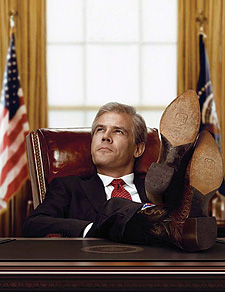 W. is a film about sincerity - how it can shape and propel a man to the loftiest seat of power - and how, ultimately, it is an insufficient defense in any trial.
W. is a film about sincerity - how it can shape and propel a man to the loftiest seat of power - and how, ultimately, it is an insufficient defense in any trial.
As a director Oliver Stone is fascinated with grand projects. Consider his back catalogue: JFK, Alexander, Nixon. Close inspection would also show that he is equally given to small-scale, intensely human stories: Wall Street, Any Given Sunday, Natural Born Killers. His latest epic about the rise and fall of America's 43rd president straddles both categories.
W. charts the life of George W. Bush from his drunken days in Yale and the Texas oil fields to his White House struggles to come to terms with international terrorism. It is as unflattering as it is honest, yet what emerges is not a figure ready for ridicule but a man clearly doing the best he could under incredible circumstances. One can't help wondering whether Bush would have been a better president if the world hadn't landed on his shoulders quite so heavily. "I think ours is a take on Bush that we haven't seen," says Stone. "Audiences will have a chance to look behind the curtain to see a man we don't really know."
The single greatest factor to emerge from Stone's W. is the sincerity of George W. Bush. He is sincere in his desire to impress his successful father, and his failure to do so drives him from career to career and bottle to bottle. When he finds the Lord at age 40 he believes sincerely, and allows that conviction to remake every part of his identity. And his sincere faith in the transformative power of democracy leads him to commit America to one of the most ill-thought-out offensives in the history of the world.
W. makes much and little of George W. Bush's faith in God. It factors in everything he does from his drinking habits to his political aspirations. He is even presented as deciding to run for the White House on the basis of a semi-messianic message from the Almighty. "I feel that God wants me to do this - and I must!" he tells a prominent pastor. Once in office Bush continues to behave as a man who believes that God is watching over his shoulder, insisting that the most high-powered meetings are closed in prayer. But for all of this referencing, the viewer learns very little about the God that Bush serves - He is too clouded by Bush's assumptions about America and the world at large.
Bush is portrayed as a man with the conviction required to gain the top job, but none of the understanding necessary to do it. He has a strong sense of what he wants - "to make this a better world for everyone" - but little idea how to achieve it. Stone portrays this admirably with a scene set on the president's Texas ranch in which the entire cabinet is so busy listening to George they are suddenly startled to realise that not even he knows where they are. Bush is presented as a simple man who is flummoxed by complex legal, political and military arguments and would prefer to live on instinct. "I'm a gut player - I go with my gut." But like many people his 'gut' delivers a world view based more on desire than reality.
Stone's Bush demonstrates clearly that sincerity of belief is not enough. Not even a president of the United States of America can make the world mirror his imaginings. Yet his fault is as common in the suburbs as it is in the White House. Every time the topics of God or Jesus or life after death arise, you will hear people voice sincere beliefs that have no basis in fact. They will act sincerely on these beliefs, and require others to accept them on an equal footing with any other belief because of their sincerity. But what good does will it do them if we do so? Their sincere belief in a God who does not judge will be no more cable of providing for them on the last day than a sincere belief in Santa will add a single present at Christmas. Worse, if they are people with influence like parents, teachers or even presidents, they are likely to lead others off into their make-believe world, losing themselves and their followers along the way.
Today the world has a superfluity of people ready to reveal the fallacies of Bush-thinking. Hopefully it will also contain plenty of Christians prepared to commend people's sincerity about spiritual things, and yet point out where they are sincerely wrong.




















